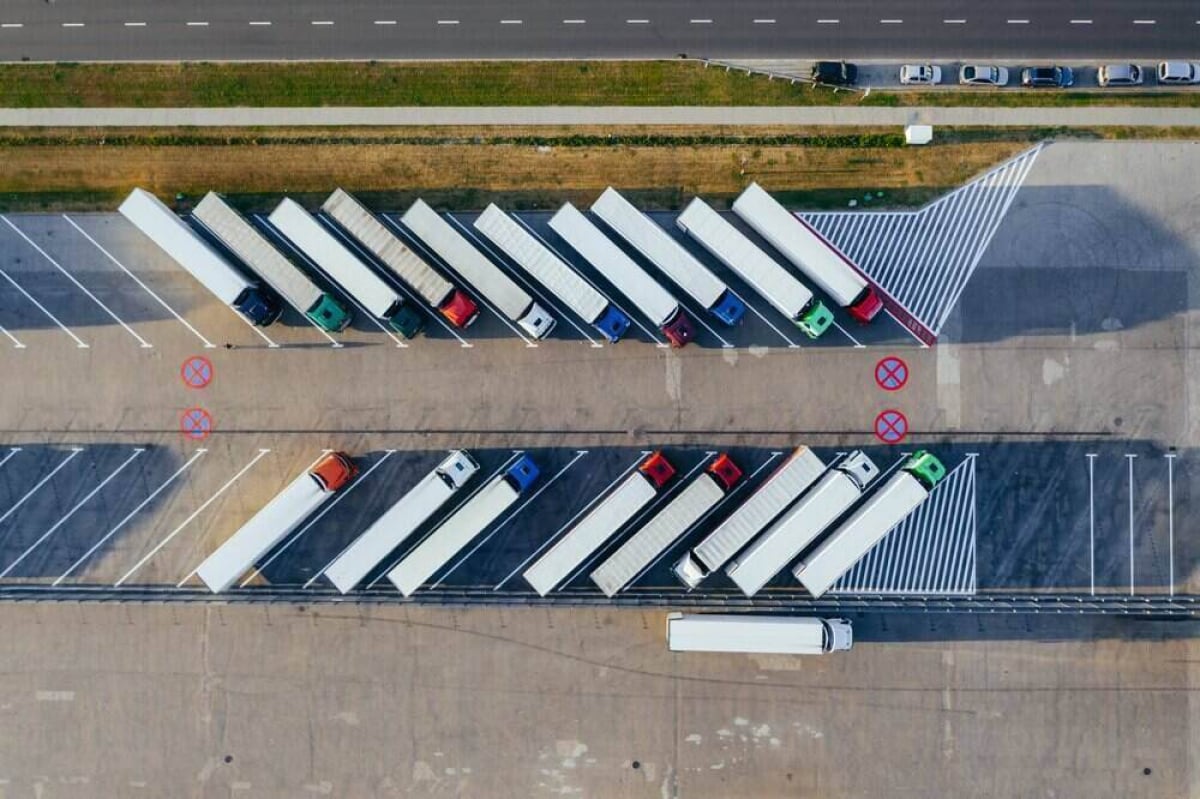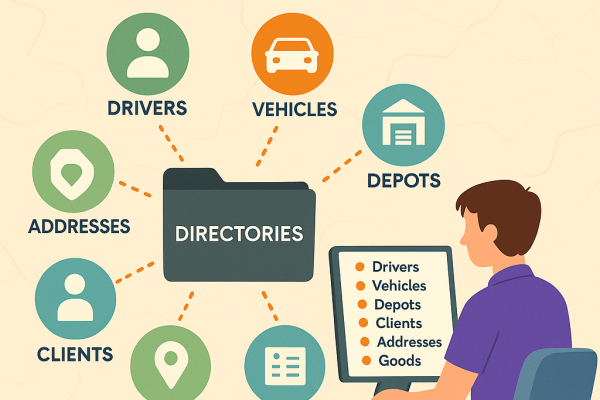7 Reasons Fleet Maintenance Is Important For Your Business

by
Andrey Baturin
March 29, 2021
If you run a delivery or logistics business, then fleet maintenance is an essential process to get done properly. For any business that relies on transport, the implementation of a fleet management system is imperative. This helps to maintain some of the business’s most valuable assets, as well as keep a necessary level of fleet compliance and safety.
The importance of regular fleet maintenance should never be overlooked. The operation of the fleet directly affects how the business as a whole operates. A well-run fleet results in a more cost-effective and smooth-running business.
What goes into fleet maintenance
Essentially, maintaining your fleet is about keeping your vehicles in good condition. In other words, the purpose of fleet maintenance is to ensure that vehicles are safe to drive. Vehicles require regular maintenance checks and care to make sure that they are running smoothly, safely, and efficiently.
Businesses that utilize a fleet of vehicles need to have clear fleet maintenance plans in place. These should be regularly applied. Often businesses with large fleets will even have their own dedicated mechanic which can save costs over the long run. Fleet maintenance is divided into two distinct types. We have outlined these below.
Preventative maintenance
Based on the milage of each vehicle, fleet managers can arrange for regular maintenance. They could also schedule maintenance based on when vehicles were last serviced. Either way, regular vehicle inspections are important for staying up to date with the condition of the vehicle and making sure that the vehicles are fit for use.
Preventative maintenance is about checking up on the condition of the vehicles to see if any repairs need to be done.
Doing this can help to avoid emergencies, which can result in expensive repairs. Rather than being reactive, this proactive approach ensures that maintenance runs smoothly.
Immediate maintenance
Also known as emergency maintenance, this is when you need to quickly fix an issue when one comes up. You never know when something might go wrong with a vehicle and when it may require immediate attention.
It is important that the business has a plan in place for emergency maintenance operations in case any arise and require immediate attention.
Fleet management should aim to avoid the risk of frequent immediate maintenance by offering regular preventative maintenance checks. Regular emergency maintenance operations can become expensive.
How does fleet maintenance help your organization
Without a regular fleet maintenance management program, businesses can face various challenges during their operations. Here are some of the main benefits of fleet maintenance.
Vehicles will have an extended lifespan
Implementing proactive maintenance measures reduces the risk of breakdowns and emergency repairs on vehicles. Ultimately, this helps to keep the vehicles in good running order. A well-maintained vehicle will last longer and provide more value to a business.
If vehicles are not properly maintained, they may start to gather various safety and maintenance issues that are not even seen. When these issues arise, they will only get worse over time, something that can permanently damage the vehicle and result in a shorter life of service to the business.
Vehicles will spend more time on the road
The last thing a busy courier business wants is to pull one of their vehicles off the delivery route to go in for repairs. By regularly going through preventative maintenance, there will be less risk for emergency repairs. This will mean vehicles will get to spend more time actually servicing the business.
Keeping vehicles functional and safe is essential for keeping the business operations running smoothly. This improves the reliability of delivery vehicles, making sure that no vehicles are left out of commission. This will save money and avoid unwanted delays in deliveries.
Lower repair costs
When owning a vehicle, repairs are a given. However, regular small repairs will end up being much cheaper than big repairs over the long run. Fleet maintenance needs to be carried out on a regular basis to make sure that any small issues are quickly dealt with. Otherwise, large repair jobs like replacing an entire engine could result from years of neglect. This would be very expensive.
Lower operational costs
Vehicles accumulate various costs other than just repairs. This includes things like fuel and insurance. If you keep your vehicle in the best possible condition, then it will maintain a higher value, and perform more efficiently.
Regularly maintained vehicles are also less likely to end up in any accidents. These vehicles will be more roadworthy and will drive safer. Accidents can result in many costs, such as vehicle replacements, delivery losses, medical care, legal fees, and rising insurance premiums. Regularly spending small amounts on fleet maintenance can help to significantly reduce larger operational costs from forming.

Increased safety
Driver safety should be a top concern for any logistics manager. If a vehicle is properly maintained and kept in a good roadworthy condition, then it will be safer to drive. There will be less risk of mechanical accidents occurring.
A typical example of this would be regularly checking the tires and making sure that they are up to roadworthy standards. Worn-out tires can easily cause accidents while driving - putting the driver at risk.
Increased safety is also an important element of driver satisfaction. Drivers don’t want to have to worry about their safety or the state of their vehicle. Fleet maintenance helps to make employees feel more comfortable and confident while driving.
Vehicles don’t just need to be safe for enhanced business operations, but they also need to meet important regulatory requirements. Most countries have a governmental body that regulates truck and driver safety. These bodies hold companies with fleets to high maintenance standards.
If you do not meet their requirements, repairs and changes will have to be made to your fleet. This can result in unnecessary expenses. In addition, you will be forced to take your vehicles off of the road, until they meet the regulatory standards. Of course, keeping up with vehicle compliance is also critical for driver safety.
A better business reputation
Nobody wants to support a business if they know the drivers are at risk, or they would be gambling with the safety of their delivery packages. Fleet maintenance not just essential for your internal business operations, but it gives your company a better name. A safe courier service is a good courier service, and this will build a greater level of trust with consumers.
Greater fuel efficiency
A well-maintained vehicle is a more fuel-efficient one. Fuel expenses can be huge. This is something that any courier service would love to reduce. If a vehicle is running smoothly, with a healthy engine and good tires, then it will certainly be more fuel-efficient. This can result in major savings over time – making up for the added expense of regular fleet maintenance.
Why fleet maintenance can be difficult to do
Fleet maintenance may seem fairly straightforward, but it is not always the easiest task to perform. Regular maintenance procedures offer challenges and plenty of planning.
First of all, you must decide when to perform fleet maintenance. Businesses that have large fleets of vehicles may struggle to keep track of each individual vehicle’s mileage, and when they may need a service.
Some businesses might perform scheduled maintenance checks every week, two weeks, or monthly. This can work well for a regular routine, but it also requires all of the vehicles to be in the same place for a maintenance inspection.
This brings us to the next maintenance challenge - keeping your vehicles on the road. A difficulty with maintenance is that it can only be carried out when your vehicle is not doing deliveries. If you pull the entire fleet off the road for maintenance, this can seriously affect your business operations. Logistics managers should try to perform maintenance checks outside of business hours for maximum productivity.
If any serious issues are found, this will result in the vehicle being taken off its delivery route and sent away for repairs. This can seriously slow you down and affect the entire delivery schedule.
Mechanics can also be another challenge. If the fleet of vehicles only requires minimal repairs, then one mechanic can often take care of many vehicles. However, if more than one vehicle needs a serious, time-consuming repair job, then additional mechanics will have to be brought in. As you can imagine, this is quite costly.
Keeping up to date with fleet maintenance is also a big task. Careful records of maintenance need to be kept, and each vehicle needs its own logbook. Most organizations still make use of paper-based systems for this task, even though it is an incredibly time-consuming and inefficient method.
Using fleet management technology
To avoid the many challenges that can present themselves in fleet management, technology needs to be used. There are tech solutions for all kinds of industries to help improve management. We have listed the three main ways you can leverage fleet management software to enhance the process of fleet management.
Paperless
Going paperless is not only more sustainable but also more efficient. Fleet management can involve loads of paperwork. This is something that is both time-consuming, as well as dangerous. Any paperwork that gets misplace can have major repercussions when it comes to compliance or selling a vehicle. Keeping all vehicle information on a cloud-based system is easier, faster, and safer.
Easy checks
Fleet management software can come in the form of a mobile app that drivers can carry around with them. This allows them to perform quick daily checks with much greater ease. All information is then accessible by the fleet managers.
Defect reporting
Any defects found can be quickly reported onto the cloud-based system. This creates better information sharing, and it allows managers to get to maintenance faster. Better reporting can save time, money, and improve safety standards.
How does Track-POD help
Checking the safety and compliance of vehicles can be a major task. This is something that should certainly be assisted with the use of technology built for the purpose. Track-POD offers a safety management system specially designed for vehicle checks. This helps to keep businesses up to date with compliance while removing the inefficiencies of a paper-based system.
The Track-POD mobile app can easily record all inspections electronically. This keeps an accurate record of each vehicle without the need for unwanted paperwork. Minimizing paperwork increases efficiency and reduce wasted time.
Track-POD also offers a single platform to keep all asset and vehicle information in one place. This makes accessing information faster, and easier, while performance checks are carried out more accurately.
- A particularly helpful feature of an app like Track-POD is that you can report any defects with a photograph. This allows maintenance managers or drivers to clearly report any maintenance issues which can assist in a more transparent chain of responsibility. This also helps to make communication easier and more effective for any possible emergency maintenance operations.
- The Track-POD app is really easy to use. It has been specially designed for all drivers to carry around and perform fast and easy maintenance checks. The Track-POD platform allows you to access a fully customizable checklist relating to the maintenance procedures. This can include individual vehicles too. All vehicles have their maintenance history clearly visible in one place.
- The platform also offers a personal profile for each vehicle which makes it easy to find any previous reports or data on that specific vehicle.
- Using an app like Track-POD gives logistics and maintenance managers a single platform that is fully optimized for carrying out faster, more effective maintenance.

Final thoughts
Fleet management is an essential task for any business that relies on its vehicles. Not only is this important for keeping up with vehicle compliance and safety standards, but regular maintenance can save time, money, and help to keep the business operating smoothly.
To make sure that you enhance your fleet management process as much as possible, using the right software for vehicle checks is a must. This removes any complications in the process, making it faster and easier to perform thorough, safe vehicle checks.
- Transportation management
About The Author
Andrey Baturin
CEO of Track-POD. Helps Companies Deliver More than Expected, Better, Faster and Safer with Paperless&Contactless Delivery at Track-POD.







